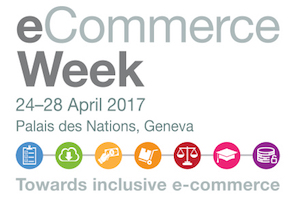E-commerce in Africa
24 Apr 2017 02:00h
Event report
The session, moderated by Ms Joy Kategekwa, Head of Regional Office for Africa, UNCTAD, addressed the challenges, opportunities, and trends of e-commerce on the African continent, with emphasis on participation in global value chains, entrepreneurship, enabling frameworks, and regulatory developments.
H.E. Mr Okechukwu Enelamah, Federal Ministry of Industry, Trade and Investment, Nigeria, started the discussion by distinguishing between e-commerce as a World Trade Organization (WTO) negotiation issue, and e-commerce in the context of the digital economy. It is the latter that provides the bigger picture, including opportunities for developing countries, job creation, transparency increase and venture capital. The restricted lens of WTO negotiations can limit engagement with the overall changes in the global economy, including transformations in policy, technology and domestic politics. He pointed to a McKinsey study estimating an investment of over one billion dollars in e-commerce in Africa in 2017 and 2018, but warned about the difficulties with spectrum management, the liberalisation of the telecommunications market, as well as competition law.
Dr Francois Ngarambe, Ambassador of Rwanda to Switzerland and Permanent Representative to the UN, WTO and other International Organisations in Geneva, provided concrete examples from the measures taken by his government to make ICT a true enabler of economic development. Among these is the commitment to have full broadband coverage across the country by 2020, but also to focus on digital literacy and digital education for all. To achieve this vision, a set of institutions was set in place. The ministries complement each other at the policy, regulatory, and implementation level and coordinate extensively. The Ministry for Youth and ICT is such an example, in charge of proposing policies to the government on issues that are strongly interlinked.
The next speaker, Ms Wendy Eitan, E-Commerce and Physical Services Coodinator, Universal Postal Union (UPU), introduced the work of her organisation and their priorities in the digital economy. The UPU has 192 member countries, but it is one of the smallest UN agencies. It plays a key role in the delivery of goods, and it is thus crucial for e-commerce, which has recently been placed at the top of their agenda. In rethinking infrastructure and services, their three main focuses are:
- working with member countries on a regional level to improve infrastructure
- easy export services, facilitating trade for SMEs and to help them access the global market
- ecom@Africa – one integrated programme for Africa in co-operation with national governments. The programme was launched in Tunisia recently and will be expanded.
Providing a perspective from the private sector, Ms Candace Nkoth-Bisseck, Country Director, Jumia Market, Cameroon, highlighted the limitations and difficulties of implementing e-commerce in African countries. First, digital literacy generally does not include a business component; while people may be ready to use social media platforms, it takes much longer for them to learn how to use the Internet for their community or for business purposes. Second, logistics pose a main problem in Africa: locating the customer when there is no fixed address system is rather difficult and expensive (phone calls at different stages of the process). Some innovative solutions for geolocation (e.g. what3words, Google maps) provide alternatives, but have not yet been widely deployed. Third, cross-country transactions are still cumbersome, due to a lack of harmonised regulation in the trade of goods and difficulties in operating financial services.
A second business view was introduced by Mr Leonard Stiegeler, General Manager, Ringier Africa. His company works in 10 African countries on developing online market places (for cars, property, jobs, etc.) in co-operation with local SMEs, news and media platforms, as well as digital services to run e-commerce set-ups for companies that want to sell to and/or out of Africa. Outlining what needs to be done to further enhance e-commerce on the continent, Stiegeler pointed to the need to address informal retail, facilitate payments via mobile transactions and use the Internet to produce, buy and sell on demand. He cited the estimates of the McKinsey Global Institute of a total of 75 billion dollars put into the e-commerce economy in Africa by 2025, ten times bigger than in 2015.
Working extensively on entrepreneurship in African countries, representatives of UNCTAD contributed to the panel discussion by highlighting their efforts in entrepreneurship and a cohesive development across sectors. UNCTAD operates 20 centres for entrepreneurship on the continent, driving job seekers to become job creators and innovators. There are more than 200 innovation hubs in Africa. Among the best ones of these are those that combine a physical space (often an open space for networking and co-creation) with mentorship schemes and a safety net for failures. Yet they rarely include training facilities. Mr Dominique Chantrel, TrainForTrade Programme, UNCTAD, outlined their capacity building work on e-commerce in Africa, including a project that was recently completed in eight West African countries, including both face-to-face and online learning.
The session concluded with a Q&A. Alongside the input from a Senegalese government representative on developments taking place at the national level, questions were raised about the ways to formalise the informal sector and how to create adaptive regulation. The moderator concluded the panel by summarising the plethora of opportunities brought about by e-commerce, in addition to the potential to propel a manufacturing trajectory in Africa.
Related event

